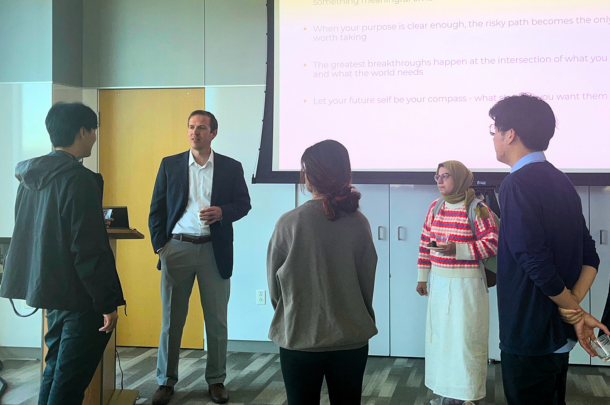MSE entrepreneurs return to inspire students
Giordana Verrengia
Dec 19, 2024

Kernion speaks with CMU students after his lecture in October.
Each year, the Scott Institute for Energy Innovation invites alumni speakers to share their experiences at its Entrepreneurial Student Lunch Seminars. This year’s seminars featured two graduates of the materials science and engineering program who are working in startups focused on innovative technologies.
In October, Sam Kernion (M.S. ‘10, Ph.D. ‘12) spoke to students about his role as CEO at CorePower Magnetics, a startup is driving the development of next-gen magnetic components and electric motor technologies that can help EVs go farther, charge faster, and reduce energy needs for growing sectors like data centers. The technology for the company was created at Carnegie Mellon and the National Energy Technology Laboratory (NETL), with Kernion as one of the creators.
Though Kernion worked in industry for several years immediately following graduate school, his entrepreneurial roots began in Mike McHenry’s nanocrystalline alloys research group. Through this group, he met Paul Ohodnicki, a recent CMU graduate from McHenry’s group who was working at NETL at the time while collaborating with CMU on the development of the strain annealing technology behind CorePower. Along with Ohodnicki, who is now CorePower’s chief technology officer, McHenry, Leah Ohodnicki and Kevin Byerly were all co-founders of the company.
“Working at a startup is a very refreshing process — you’re surrounded by people who are at the company because they feel passionate about its mission, and they’re excited about what it can mean for the region,” said Kernion.
During his visit with CMU’s Scott Institute for Energy Innovation, a guiding question that Kernion presented to a group of entrepreneurial-minded students was: “What problem are you solving?” While the answer wasn’t immediately clear when Kernion completed graduate school in 2012, by the time the technology was patented in 2019, EVs and their charging needs formed a bigger part of the decarbonization conversation. The timing was right for CorePower to officially launch the following year.
Since then, CorePower has received considerable support from the Department of Energy (DOE), including $20 million to develop a manufacturing facility in Pittsburgh for magnetic components and advanced metals that are currently produced by foreign supply chains. Another $1 million from the DOE is earmarked for rare earth-free electric motor development. Both DOE projects serve the goal of increasing domestic manufacturing of transformers, inductors, and electric motors, as rare earth elements are mostly sourced from China.
Kernion noted that spinning a startup out of an academic setting has been a difference maker in how the company has expanded its network.
“I think a unique aspect about startups in general is that you think you’re going to be isolated, but there’s a tremendous network — and CMU has been a tremendous partner for us,” he said.
A unique aspect about startups in general is that you think you’re going to be isolated, but there’s a tremendous network — and CMU has been a tremendous partner for us
Sam Kernion, CMU MSE Alumnus, CorePower CEO
In November, Dylan Lew (B.S./M.S. ’21) was the keynote speaker at the lunch series, sharing his path to entrepreneurship that also started during his time as a CMU student. Lew met a group of like-minded students from the University of Pittsburgh and the University of Michigan who had built the first-ever Portable Farm Aquaponics System in the area.
His first job on that team was to clean the fish tank that supported the aquaponics system and figure out what to do with the biogas produced from the initial design of a biodigester. Today Lew is the CEO and co-founder of Ecotone Renewables, a food waste startup that was born out of the student braintrust that he joined in his first year of college.
“It’s been very busy the past few years,” said Lew, who brought Ecotone Renewables to closer fruition while completing the College of Engineering’s integrated bachelor’s-master’s (IBM) program. “We’ve brought on new investors, and now we’re in the commercialization phase. We’ve deployed and operated eight biodigesters across the Northeast region.”
Food that gets thrown away is responsible for about 8 percent of global greenhouse gas emissions — roughly twice the level of emissions produced by aviation. To combat this common yet inconspicuous environmental hazard, Ecotone Renewables developed the Zero Emissions Upcycling System (ZEUS) to provide on-site food waste management to a growing number of clients around the northeastern United States. ZEUS works exactly like the stomach, first by grinding up food waste and mixing it with rain water, then transferring the smoothie-like substance from a dosing tank to a stomach tank, where food waste biodegradation happens. This creates two byproducts: a biogas and a liquid fertilizer, known as Soil Sauce, which is available commercially in at least 50 retailers. Local end users include the City of Pittsburgh and Allegheny Health Network, though ZEUS’ reach is growing. Ecotone Renewables recently signed its first international client, Compass Group Canada, a foodservice and hospitality company.
Making strides in sustainability can feel hampered by technical breakthroughs that haven’t materialized yet, but Ecotone Renewables is helping clients reduce their food waste in the here and now.
“What’s interesting is that a lot of companies have waste reduction goals but they’re struggling to meet them,” said Lew. “Having a quick-to-implement solution, like ZEUS, can give clients a pretty big jump on meeting those goals.”
Lew’s early success just three years after graduation has earned him acknowledgement from Forbes Magazine’s “30 Under 30” in Energy and Green Tech as well as the Recent Alumni Outstanding Achievement Award from the College of Engineering.